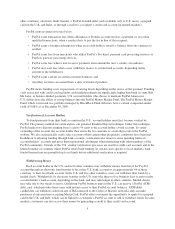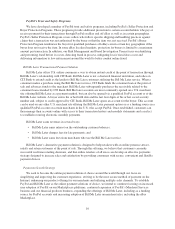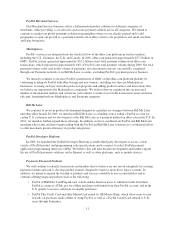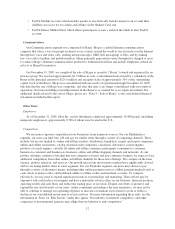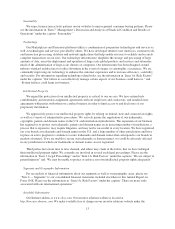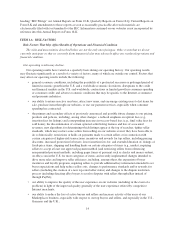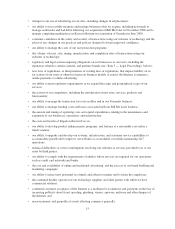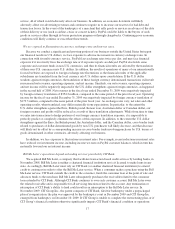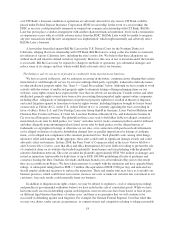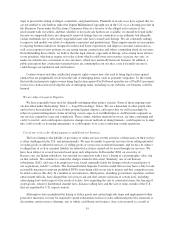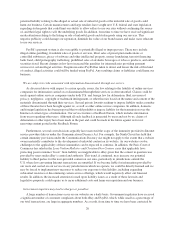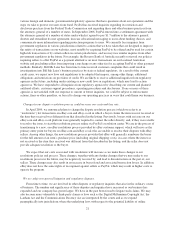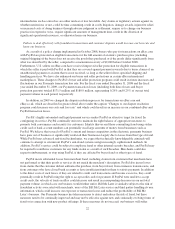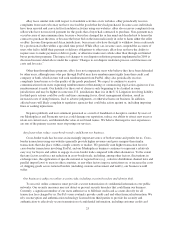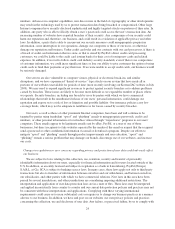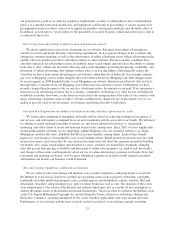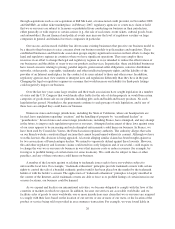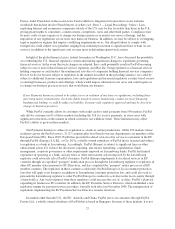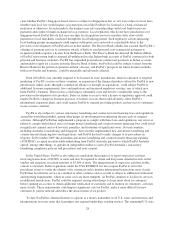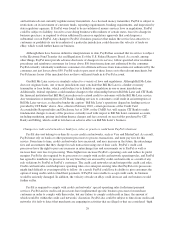eBay 2009 Annual Report Download - page 27
Download and view the complete annual report
Please find page 27 of the 2009 eBay annual report below. You can navigate through the pages in the report by either clicking on the pages listed below, or by using the keyword search tool below to find specific information within the annual report.steps to prevent the listing of illegal, counterfeit, and pirated items. Plaintiffs in recent cases have argued that we
are not entitled to safe harbors under the Digital Millennium Copyright Act in the U.S. or as a hosting provider in
the European Union under the Electronic Commerce Directive because of the alleged active nature of our
involvement with our sellers, and that, whether or not such safe harbors are available, we should be found liable
because we supposedly have not adequately removed listings that are counterfeit or are authentic but allegedly
violate trademark law or effectively suspended users who have created such listings. We are constantly seeking
to improve and modify our efforts to eliminate counterfeit and pirated items. These improvements are in response
to ongoing business initiatives designed to reduce bad buyer experiences and improve customer satisfaction as
well as in response to new patterns we are seeing among counterfeiters and others committing fraud on our users.
Notwithstanding these efforts, we believe that the legal climate, especially in Europe, is becoming more adverse
to our positions, which may require us to take actions which could lower our revenues, increase our costs, or
make our websites less convenient to our customers, which may materially harm our business. In addition, a
public perception that counterfeit or pirated items are commonplace on our sites, even if factually incorrect,
could damage our reputation and our business.
Content owners and other intellectual property rights owners may also seek to bring legal action against
entities that are peripherally involved in the sale of infringing items, such as payment companies. To the extent
that intellectual property rights owners bring legal action against PayPal based upon the use of PayPal’s payment
services in a transaction involving the sale of infringing items, including on our websites, our business could be
harmed.
We are subject to patent litigation.
We have repeatedly been sued for allegedly infringing other parties’ patents. Some of these ongoing suits
are described under the heading “Item 3 — Legal Proceedings” below. We are a defendant in other patent suits
and we have been notified of several other potential patent disputes, and expect that we will increasingly be
subject to patent infringement claims involving various aspects of our Marketplaces and Payments segments as
our services expand in scope and complexity. These claims, whether meritorious or not, are time consuming and
costly to resolve, and could require expensive changes in our methods of doing business, could require us to enter
into costly royalty or licensing agreements, or could require us to cease conducting certain operations.
Use of our services for illegal purposes could harm our business.
The law relating to the liability of providers of online services for the activities of their users on their service
is often challenged in the U.S. and internationally. We may be unable to prevent our users from selling unlawful
or stolen goods or unlawful services, or selling goods or services in an unlawful manner, and we may be subject
to allegations of civil or criminal liability for unlawful activities carried out by users through our services. We
have been subject to several lawsuits based upon such allegations. In December 2004, an executive of
Baazee.com, our Indian subsidiary, was arrested in connection with a user’s listing of a pornographic video clip
on that website. We continue to contest the charges related to this arrest. Similarly, one of our Korean
subsidiaries (IAC), and one of its employees were found criminally liable for listings (which occurred prior to
our acquisition) on IAC’s website. The German Federal Supreme Court has ruled that we may have a duty to take
reasonable measures to prevent prohibited DVDs from being sold on our site to minors and that competitors may
be able to enforce this duty. In a number of circumstances, third parties, including government regulators and law
enforcement officials, have alleged that our services aid and abet certain violations of certain laws, including
antiscalping laws with respect to the resale of tickets, laws regarding the sale of counterfeit items, the fencing of
stolen goods, selective distribution channel laws, distance selling laws and the sale of items outside of the U.S.
that are regulated by U.S. export controls.
Although we have prohibited the listing of stolen goods and certain high-risk items and implemented other
protective measures, we may be required to spend substantial resources to take additional protective measures or
discontinue certain service offerings, any of which could harm our business. Any costs incurred as a result of
19


